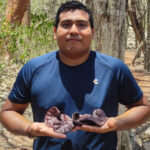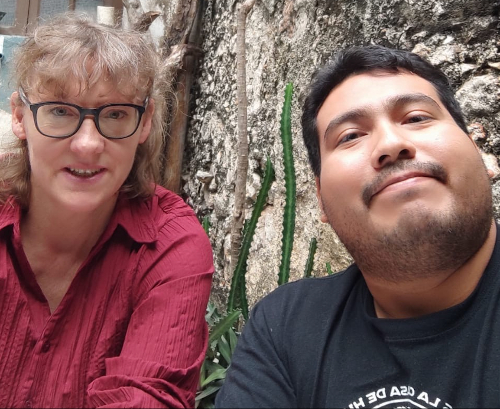To Pedro Uc,
for all the times we weren’t defeated
On Seven Ahmak we carried out our escape plan. It was then that we left the city
of Iximche because of the devil-man. Then the kings came forth. “He is certain
to die soon,” they said. “There is no longer war in Tōnatiuh’s heart, for he is
content with the metal he has been given.”
Memorial de Sololá (Annals of the Cakchiquels)
The Land
I.
In her garden, my grandmother had a plant that she called a subin che’1
it grew right beside the stone wall
where a certain type of red ant made their nest
my mother used the plant to weave hammocks
or to soothe insect bites
she tied it to taller trees
so it would consume the white plagues.
my father used its roots to extract snake venom
or to make gopher traps,
sending them into exile from their underground holes
in the city of factory workers
they call the subin che’ an Acacia
and chop it back when it sprouts between stones
in San Antonio Pich
the stone walls collapse before me
and what remains is a stone quarry
that knows nothing of sobbing.
II.
When the well became a septic tank
the last of the Rojas families left San Antonio Pich
(that’s what we heard at the textile factory)
they call the pit where they dump the corpses a well
septic flies are tiny insects that rot whatever they touch:
the houses with yellow roofs
the sunrise by the fire
the pans of tender water
before they left
they named the machines
that weren’t for making dresses
and they named them after their way of eating stones
some look like hammers
or saw-toothed shovels
or insect-crushing barrels
others sleep all day
then feed at night
and smoke their red lights in the belly of the earth
when I return to the place
we call home now
my mother tells me:
there’s coffee in the kitchen
and I watch the candle flicker out in her eyes.
III.
Before the year was over, they built a new highway
(with green signs
that our dead laughed at from their sewers)
they built on lands that had no value because they were ours
and were ours because no one else wanted them
that’s how my mother explained it to me
as asphalt rolled into San Antonio Pich
the machines melt into a language of sunglasses and Bermuda shorts
the rancid dream of the place they christened
(in a ceremony with red ribbons and a pastor)
Lomas de Montejo.
IV.
They offered my mother and me money for a piece of paper worth nothing
and gave us a 430-square-foot lot near the textile factory
with nearby schools
gray sewer air
eight nine-watt light bulbs
a stove
two outlets
a nine-foot hose
and room
for
a
bicycle
here at our new house
I no longer worry about being far away from my
father
in a land that is no longer ours
because he still tells me
(from his drawer in a kitchen cabinet)
new stories
about giants who dissolve in the rain
and dream of smashing the streetlights that hide our stars.
Translated by Allison A. deFreese
1 Its thorns resemble a bull’s horns while its tiny leaves look like a lizard’s eyes.



